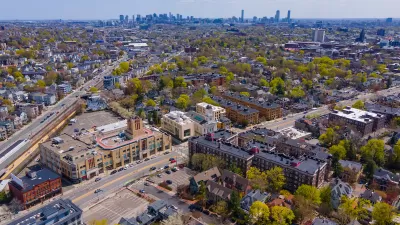In a city that survived the recession better than most, efforts to meet the demand for upscale housing will "change the face of the city for decades to come," reports Annys Shin.
According to Shin, the District's strong job market for young professionals, and a credit crunch that has made condominium conversion difficult, are putting immense pressure on the city's dwindling supply of affordable housing to undergo high-end makeovers. "As a result, low-cost rental housing is now disappearing at a faster rate than it was during the height of the housing boom, according to a new analysis of census data by the D.C. Fiscal Policy Institute...The Institute found that between 2000 and 2010, the city lost 50 percent of its low-cost rental housing. The rate of loss has accelerated since 2008, when the credit crunch began to slow condo conversions."
Writing in the City Paper, Lydia DePillis, asks whether the city's restrictive zoning, including its recently debated height limits, are a reason for the decline of housing affordability.
"It's true, affordable housing people were the driving force behind inclusionary zoning, and smart growth advocates are getting to agitate more forcefully for the city to require developers who want public land to incorporate affordable housing into their proposals. But many developers avoid the public land process altogether, preferring not to deal with all the delays and frustrations. And affordable housing shouldn't be all about setting prices artificially low-it's also about letting builders build the amount of housing this city needs."
FULL STORY: In D.C., low-cost apartments disappearing at rapid rate

Planetizen Federal Action Tracker
A weekly monitor of how Trump’s orders and actions are impacting planners and planning in America.

San Francisco's School District Spent $105M To Build Affordable Housing for Teachers — And That's Just the Beginning
SFUSD joins a growing list of school districts using their land holdings to address housing affordability challenges faced by their own employees.

The Tiny, Adorable $7,000 Car Turning Japan Onto EVs
The single seat Mibot charges from a regular plug as quickly as an iPad, and is about half the price of an average EV.

As Trump Phases Out FEMA, Is It Time to Flee the Floodplains?
With less federal funding available for disaster relief efforts, the need to relocate at-risk communities is more urgent than ever.

With Protected Lanes, 460% More People Commute by Bike
For those needing more ammo, more data proving what we already knew is here.

In More Metros Than You’d Think, Suburbs are Now More Expensive Than the City
If you're moving to the burbs to save on square footage, data shows you should think again.
Urban Design for Planners 1: Software Tools
This six-course series explores essential urban design concepts using open source software and equips planners with the tools they need to participate fully in the urban design process.
Planning for Universal Design
Learn the tools for implementing Universal Design in planning regulations.
Smith Gee Studio
City of Charlotte
City of Camden Redevelopment Agency
City of Astoria
Transportation Research & Education Center (TREC) at Portland State University
US High Speed Rail Association
City of Camden Redevelopment Agency
Municipality of Princeton (NJ)





























